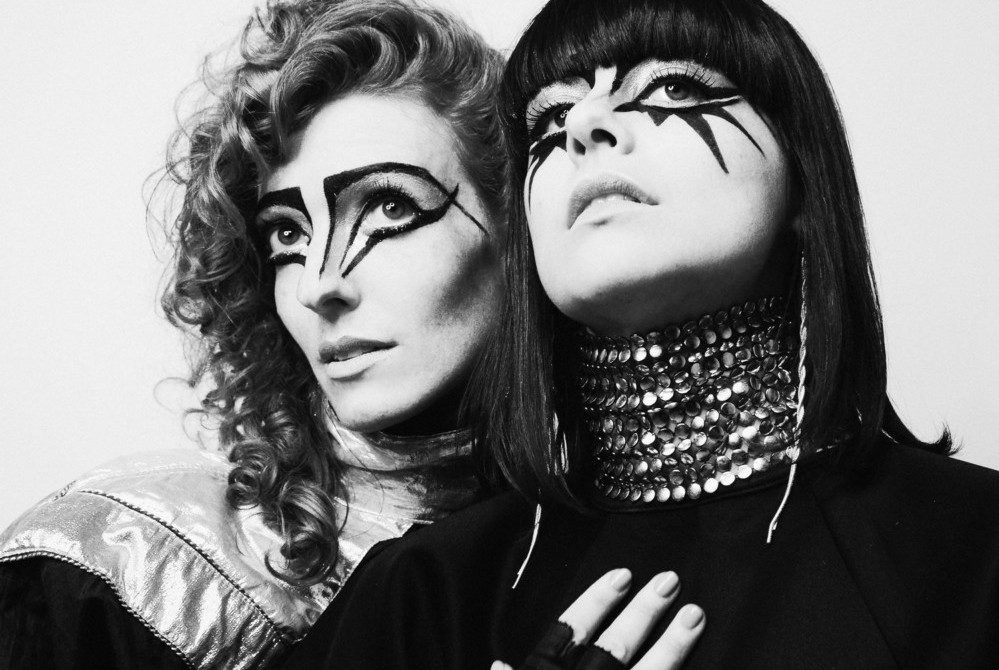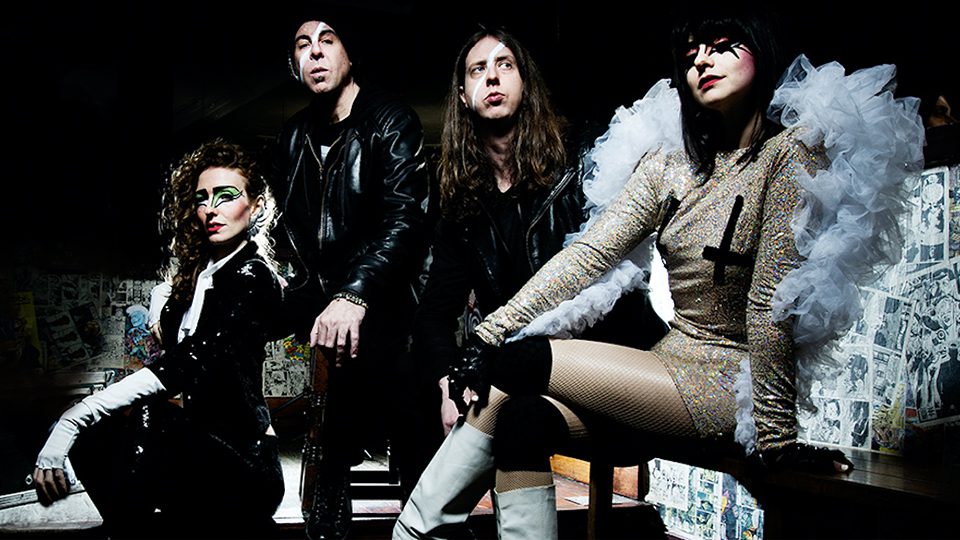
Forged in the flames of New York City’s rock club scene, glam rock outfit Mother Feather developed a stand-out style with glittering costumes and a punk rock attitude from the get-go. Its lead vocalists, Ann Courtney and Elizabeth Carena, met in college, forming a tight-knit bond and eventually adding drummer Gunnar Olsen and bassist Seth Ondracek and guitarist Chris Foley to the line-up by 2009. But it took them a number of years to release their first Mother Feather album, a self-titled debut in 2016. It took them much less time to conquer their second album, Constellation Baby, which came out November 2nd. The album doesn’t wander far from their original aesthetic, but sees the group expand beyond party rock into much more emotional territory – now, the band’s big ideas are reflected in its arena-worthy sound.
Listeners ought to know what they’re in for from the start – on album opener “Red Hot Metal” Courtney asks, “Can you handle red hot metal?” If you can’t, don’t bother sitting in for the following tracks – there is no hesitation as the musicians pull listeners quickly into their world. The album has an overall bounce to it, a collage of lighthearted anthems for a night out with friends, or dancing in your room alone. The LP’s first single, “Totally Awesome,” is akin to the fun-loving rock anthems we’ve come to expect from Mother Feather – pep-up anthem for doing your own thing and making it the best thing out there. The album is scattered with references to being yourself and rocking your own colors, which is truly what this band inspires. But there’s a depth beneath all the glitz and glam.
The song “Supernatural,” for instance, was written about a close friend of Courtney and Carena’s who committed suicide. Courtney moans, “Forest fire, don’t you want to be a rising sun?” telling a painful story of the escape that was made, and all that could have been, but will never be given a chance to grow. While fun and light in sound tonality, the underpinnings of this album are locked in the more esoteric questions, that might forever go unanswered. Similarly, the album’s title track poses deep questions for the future of women in uncertain political times. But even with darkness seemingly on the rise, this theatrical crew offers an escape by searching for something light-hearted in it all.

AudioFemme spoke with Ann Courtney regarding the hardships of bringing the album to life, how our current times impacted her work, and the importance of finding your own voice. You can catch Mother Feather’s wild live show when they play their album release show at the Knitting Factory in Brooklyn, NY on December 6th.
AF: What have you been doing in the interim between the last album and this one?
AC: Going crazy writing the album, and the election happened. The election really didn’t go the way I thought it was gonna go, and I was quite shocked and upset and confused. And a friend of ours, a dear friend of Lizzie and mine, committed suicide. This was long before the election so that was something that was a big thing to deal with. Then we went on our first tour [with] Warped Tour. So it was this epic, 41-date tour, and we kind of went from 0 to 120 in no time. It was amazing – I mean the tour was incredible, and really special, challenging of course. Then we made the album under some time and money constraints, and everyone worked really hard to get it done.
AF: Have current politics influenced your work on this new album?
AC: Our record is not in any way overtly political, but it is deeply personal and it is dealing with the personal feelings that I was experiencing during that time, and wanting to retreat. I consider myself a dreamy optimist, and I think I hear the fight of the optimist trying to remain that way. And that feeling of wanting to isolate and sort of run away from the world because it’s just too awful to go outside. I got kind of agoraphobic when I was writing this record. I wanted to be alone and wanted to work on it by myself at the beginning to start the songs from a very personal place.
AF: Has this created a different kind of soundscape or message for you in comparison to your first album?
AC: I think it’s created a much broader emotional pallet than we’ve seen before with a Mother Feather record. They are still super powerful songs, and there is still go get ’em exuberance, there’s still all of that on the record. I think we are just singing a broader range. And we are diving way deeper into the question “What is Mother Feather?” The answer is much more emotional than it’s been before.
AF: How did you incubate your own experience to think about and process what it was you wanted to create around those experiences you were having?
AC: When I know what I want I tend to be crazy impatient, but I also didn’t want to give anything away before it was ready, and we weren’t really sure that the album was going to come out for a long time. Writing it was a challenge, and the production had its challenges as well, and we had to wait for a long time, because of various label things that were out of our control. How did I incubate? I didn’t really have a choice. If it had been up to me, I was expecting that the album was going to be coming out this time last year. I didn’t exactly have a choice, but in that time I am really savoring and appreciating that it is coming out. I’m so happy about it.
AF: As a female voice in this music industry, where do you feel like your role lies in expressing these emotions?
AC: I want women to be free, and I want to be an example. Even when I was struggling through some of the darkest times writing this record, it was thinking about women and young girls that give me a very clear sense of purpose. The song “Constellation Baby” was written years ago in a very pure, pure moment, around the time before my first niece was born. I was thinking a lot about the future, especially for women, and it feels especially relevant right now, and that is why it is the centerpiece of the record.
AF: Are you still excited about playing with your glam rock identity, or do you see it as a hinderance?
AC: No, Mother Feather is glamorous by default! I never was interested in bringing back glam rock, I just am what I am – a Mother Feather. I just want to see something fabulous and sparkly, but also to be horrifying and scary. I’ve always sort of been a little nervous about the term glam, because it sort of implies just the ’70s, when glam rock [was born]. But so much of my musical totems are about the ’80s and the ’90s and contemporary music filtered through this experience. So yes, I want to see a show, and I want to put on a show that is larger than life and has a stadium feel in a small rock club. I’m not trying to be the rebirth of glam rock, I just am what I am. These songs are about big feelings, so I’m just not really interested in getting on stage and staring at my shoes, in jeans and a t-shirt. This is a special experience, it’s a sacred experience for me. So it’s gotta look and feel that way.
AF: At what point did you make that creative decision?
AC: I made that creative decision on that trip in 2009 when I went out of New York City for a brief little trip and I had this major epiphany about the experience that I wanted to give myself and give to other people and be a part of. I actually felt that the band Lizzy and I had been in before, I had sort of fenced myself in and limited myself. So Mother Feather was this ah-ha! moment of potential to be something really fucking awesome.
AF: Is there any kind of advice you would give other other female artists about how to express themselves in our current times?
AC: Try and find your own voice, whatever that is, be yourself, and that is the thing you should be. That is easier said than done – to find your own voice takes a lot of work, and it takes a lot of listening. But ultimately that would be it – you do you, and don’t be ashamed about it. Do it boldly.

